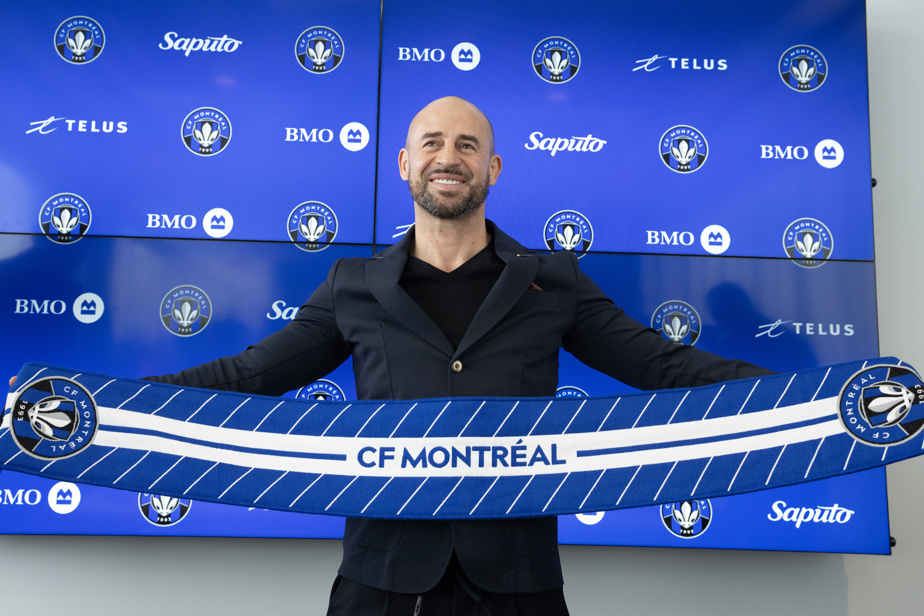“I like situations of failure. For me, it’s how you get back up, and how you come out of it. »
In Montreal, Laurent Courtois wants his players to “have the confidence to make mistakes.” As a rookie head coach, Courtois will do it himself, he explains.
“This is how we manage to develop each other, to progress. We don’t care what you did before, we don’t care about your qualities, what you did well or poorly last year. What are you bringing today? »
It is not for nothing that the questions asked to the new head coach of CF Montreal focused a lot on his philosophy of player development and style of play, Tuesday morning, at the Nutrilait Center. These principles are at the heart of the mandate entrusted to him by the club’s sports management.
These principles are also where his predecessor, Hernán Losada, partially failed.
“Laurent comes with his own style, his own philosophy which fits with ours,” underlined President Gabriel Gervais, sitting next to him. It’s now up to him to get used to it and work with the players we have in place. »
And that’s not a problem for Courtois. What is his assessment of the current workforce?
“There’s an undeniable intrinsic quality, whether it’s experienced players or just starting out,” he says. The guys have already shown it. […] We all like the elaborate game, but there is something on which I am uncompromising: it is the heart, the energy, the fighting spirit, the winning, you call it what you want. »
At CF Montreal, we call it Grinta. This is what Gervais recalled a few minutes later.
“It’s about showing heart at all times, whether in training, in matches at home or abroad,” says the president. […] This desire to always want to bleed and wet the jersey is extremely important to us. »
In this sense, the marriage between the CFM and Courtois seems to be off to a good start.
“What I want is for the fans watching us to see that we have a common goal and that we are trying to pull out all the stops. »
Even if he knows that this objective will not be achieved “overnight”, Gabriel Gervais wants to find “a style of play that is clear and clean” at CF Montreal.
And Laurent Courtois was not short of comments about what he wants to implement. We leave you in his care for a few moments.
“I want players to always be focused on playing forward and taking the time. This is the balance that we will try to find together. To always be obsessed with playing forward, being as dangerous as possible, without forcing yourself and exposing yourself to losing the ball. The creation of chances. Win the ball back to hurt. I don’t like it when we defend for the sake of defending. I want the way of defending to be quite dominant. »
“There is another element that seems super important to me: it’s how the entire workforce, as a whole, feels responsible. I want everyone to feel like they have a chance. For me, that’s what makes a team successful. […] These aspects, for me, are essential. But you need codes. Rules. A physical condition. It takes generosity. You need character, because the goalkeeper will have to do very ambitious things. And you have to be ready to respond. This is why training is vital. This is why you shouldn’t be afraid of making mistakes. It will be beneficial for everyone. »
For Courtois, the objective of establishing a good style of play and that of participating in the series do not go without one.
“I don’t see how I would make the playoffs without a [clear] style of play. And I don’t see how I would be able to play a successful style of play if I don’t make the playoffs. »
The mandate to develop the club’s young players was one of the most important criteria leading to the Frenchman’s hiring. Her qualities in this area made her “the first choice” of the club management, throughout the long and rigorous interview process that she conducted.
According to Courtois, if he managed to achieve success in this regard with the Columbus Crew reserve team, it is thanks to his previous career as a player. This Lyonnais born in 1978 played in France, Spain and England before joining MLS in 2011.
“In all humility, I was lucky enough to be talented when I was younger,” he explains. I never felt coached, but rather used. When I took this coaching course, I told myself that I wanted to help kids my age. With their failings or their abilities, I didn’t find that we helped them enough. That’s how I learned my job as a coach. Afterwards, I was in environments that were not always successful, so it taught me to put things into perspective and understand different aspects of the player training process. »
“In order” of importance, for him, “it’s the man, the player, and then the team.”
“You apply that to all positions, and we move forward. »
